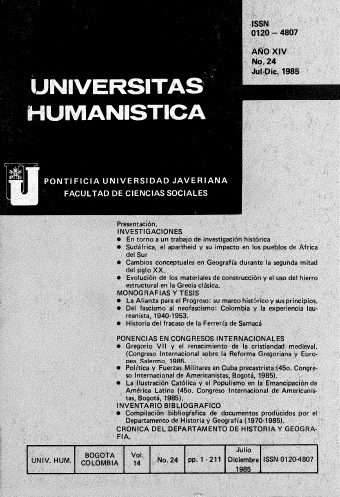Resumo
En la urgente tarea de fundamentar históricamente el proceso de gestación de los derechos humanos y conocer científicamente las bases de la paz, en el desarrollo de las sociedades, la escuela de Salamanca representa el centro de interés. Su trascendencia es todavía más significativa, en relación con la historia del siglo XVII y XVII! en Hispanoamérica. El pensamiento de Francisco Suárez, representante cumbre de la escuela, logró enraizar en la conciencia americana determinando hasta cierto punto el despertar del pensamiento y sentimiento emancipador, no obstante la censura y oposición del régimen Borbón en su afán de centralización y reforma.

A revista Universitas Humanística encontra-se registada sob a licencia Creative Commons Versão 4.0 Internacional. Portanto, esta obra pode se reproduzir, distribuir e comunicar publicamente em formato digital, sempre que dado o crédito apropriado para os autores e a Pontificia Universidad Javeriana. Permite-se citar, adaptar, remixar, transformar, autoarquivar, republicar e criar a partir do material, para qualquer fim, mesmo que comercial, sempre que indicado apropriadamente o nome do criador, provido um link para a obra original e indicado se mudanças foram feitas. A Pontificia Universidad Javeriana não retém os direitos sobre as obras publicadas e os conteúdos são responsabilidade exclusiva dos autores, os quais conservam seus direitos morais, intelectuais, de privacidade e publicidade.
O aval sobre a intervenção da obra (revisão, correção, edição, tradução, formatação) e a subsequente difusão disponibiliza-se através de licença de uso e não através de transmissão de direitos, o que representa que a revista e a Pontificia Universidad Javeriana são isentas de qualquer responsabilidade que puder se derivar de uma prática ética pobre por parte dos autores. Em consequência da proteção fornecida pela licença de uso, a revista não fica na obrigação de publicar retratações ou alterar informações já publicadas, a não ser que a errata seja decorrente do processo de gestão editorial. A publicação de conteúdos nesta revista não representa royalties para os contribuintes.


